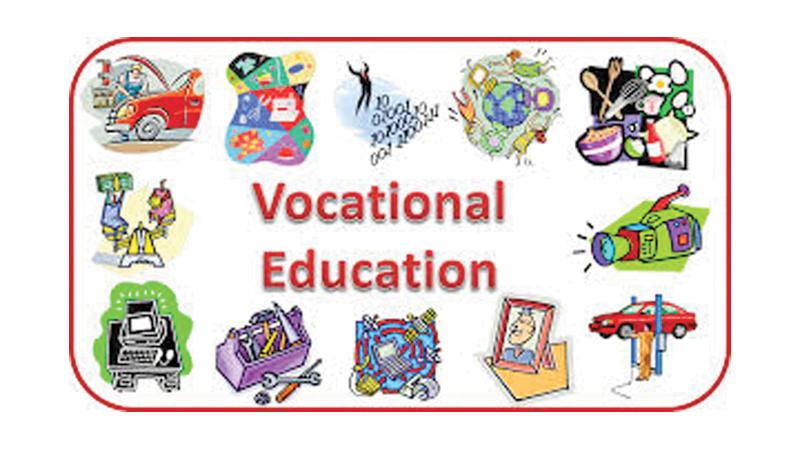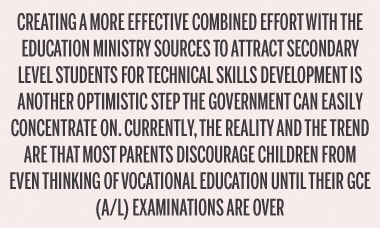
Of late 18th century, progress and prosperity have been predominantly identified with the economic growth. One of the key factors of the economic competitiveness of a country is the skills of its workforce. The skills and training of the workforce are completely dependent on the quality of the country’s vocational education systems and the level of training provided to apprentices. Hence, vocational education is one of the important elements in enhancing the economic productivity of Sri Lanka.
It is fair to mention that governments in the past several decades have given attention to this at different scales. However, due to various setbacks, mainly due to administrative and financial issues, the quality of vocational education has not shown a significant improvement during this period. Mostly, the curricula were not updated or upgraded reasonably to suit the prevailing job market requirements.
However, in proportion with President Gotabaya Rajapaksa’s vision, a new program was inaugurated recently by the State Ministry of Skills Development and Vocational Education to create a skilled workforce to cater to the needs of Sri Lankan and international labour markets.
Professional skills
The goal of the ‘Skills Sri Lanka’ program is to equip the youth in Sri Lanka with the professional skills needed to match the advanced requirements of the modern world. If the program becomes a success, the outcome will provide solutions to many recurring issues related to labour skills that were common during the past many years.
 Although the State Ministry functions under a seemingly capable state minister, regrettably, this writer’s attempts to communicate with the Media section of the State Ministry to obtain further useful information was not successful. The state ministry website has not enclosed any information about this important program at the time of this article. The website only contains obsolete news as yet.
Although the State Ministry functions under a seemingly capable state minister, regrettably, this writer’s attempts to communicate with the Media section of the State Ministry to obtain further useful information was not successful. The state ministry website has not enclosed any information about this important program at the time of this article. The website only contains obsolete news as yet.
Vocational education is a tool for addressing the economic, political, and social issues in a developing country such as Sri Lanka where economic and political stability becomes frequently volatile. Rising unemployment, continuous scarcity of skilled workers, the high youth dropout rate from technical education, and the recent job losses due to the Covid-19 pandemic have produced a situation to rethink and recreate vocational education and training from a new angle.
With new policies of the ‘Vistas of prosperity and splendour’, the Presidential vision, Sri Lanka is attempting to change over to an efficiency-driven economic development system. Therefore, in order to move up the value chain, efficient and effective technical and vocational education and training have become exceedingly vital. A Higher and value-added production capacity is a key factor to improve the country’s competitiveness and growth momentum.
Unemployment
Sri Lanka’s overall unemployment rate was around 4% during the past several years whilst youth unemployment (ages between 20 years to 29 years) stands at a significantly higher rate of approximately 19%. Despite the high youth unemployment, on the demand side, employers find it difficult to recruit skilled labour at the operational levels. The issue of scarcity of skilled labour is a continuous pressing issue for Sri Lankan entrepreneurs.
According to reports, the Sri Lankan TVET sector comprises approximately around 400 service providers in the public, private, and NGO sectors. The National Vocational Qualification (NVQ) introduced by the Tertiary and Vocational Training Commission (TVEC) predominantly aims at GCE (A/L) students and also GCE (O/L) dropouts. This was an extremely useful step taken towards upgrading vocational education.
Certification from level 3 to level 7 has given a good vocational background to those who opted to go on with vocational subjects after secondary education. The authority of award of The NVQ certifications was granted to key public institutions such as the Department of Technical Education and Training (DTET), National Industrial and Apprenticeship Training Authority (NAITA), Vocational Training Authority (VTA), National Youth Services Council (NYSC) and some of the selected institutions of the private and NGO sectors.
The Tertiary and Vocational Education Commission, the apex body was established in 1991 with a mandate of taking responsibility for policy formulation, planning, coordinating, and developing of vocational education monitor the registration, accreditation, and quality management systems of the approved TVET institutions.
Despite monitoring, the quality of programs varies depending on the institution substantially. Employers, particularly the private sector declare that the quality and the education systems do not meet the actual skill needs up to now.
The general complaint is that the TVET students who seek employment in the private sector are not adequately exposed to the private sector culture and that they lack business sense. Perhaps, it is time for the authorities to concentrate on including modules on business practices such as marketing, logistics, human resources, etc. These modules should contain simple subject matter with basic information.
Several important factors contribute to weak TVET outcomes that need prompt action. Some of them are poor quality of secondary education in rural schools, outdated standards and curricula, lack of properly trained instructors, shortage of material and equipment, inadequate facilities at training centers, and incompatibility of the courses offered with employability, limited financial resources provided by the government, etc.
Job market
Escalating youth unemployment has become a major social and economic setback for many countries in the world including Sri Lanka. Every year hundreds of thousands of youth enter the job market in Sri Lanka that has limited space in employment. The consequence is a threat to society and is substantial due to the frustration created by lack of income, and even potentially soaring criminality among youth.
Properly planned and managed vocational education is vital for two major reasons primarily. Firstly, it is regarded as a tool for promoting economic growth. Secondly, vocational education is one of the best remedies for growing youth unemployment, thus fostering social inclusion. Vocational education and training provide opportunities for the youth to access the labour market with dignity with recognised educational qualifications. It provides a better opportunity for the employer to recruit workers with skills, training, and qualifications.
No doubt that the government is exerting a conscious and fresh effort to meet the challenges in the TVET sector with the ‘Skills Sri Lanka’ program. Their effort to obtain more collaboration of the private sector is an absolute necessity. The key factor is the assistance of the private sector as they only can provide adequate on-job- training for TVET students that is one of the most important aspects. The participation of the private sector in creating new curricula suited to private sector requirements is also an important factor.
Technical skills
Creating a more effective combined effort with Education Ministry sources to attract secondary level students for technical skills development is another optimistic step the government can easily concentrate on. Currently, the reality and the trend are that most parents discourage children from even thinking of vocational education until their GCE (A/L) examinations are over.
Justifiably, they expect their children to get through the hurdle and move on. If these parents can be convinced that vocational qualifications are as good or maybe better than higher education, there will be more students interested in TVET education. However, the authorities must ensure that the quality of education through TVET institutions is also of high quality.
Vocational education can enhance the quality of life of participants through work and values along with formal schooling. It can play a vital role in enhancing employment or self-employment and thus economic productivity. It certainly is an important tool to alleviate poverty. Vocational education and training improve individual productivity and increase efficiency for better participation in Sri Lanka’s overall development.
